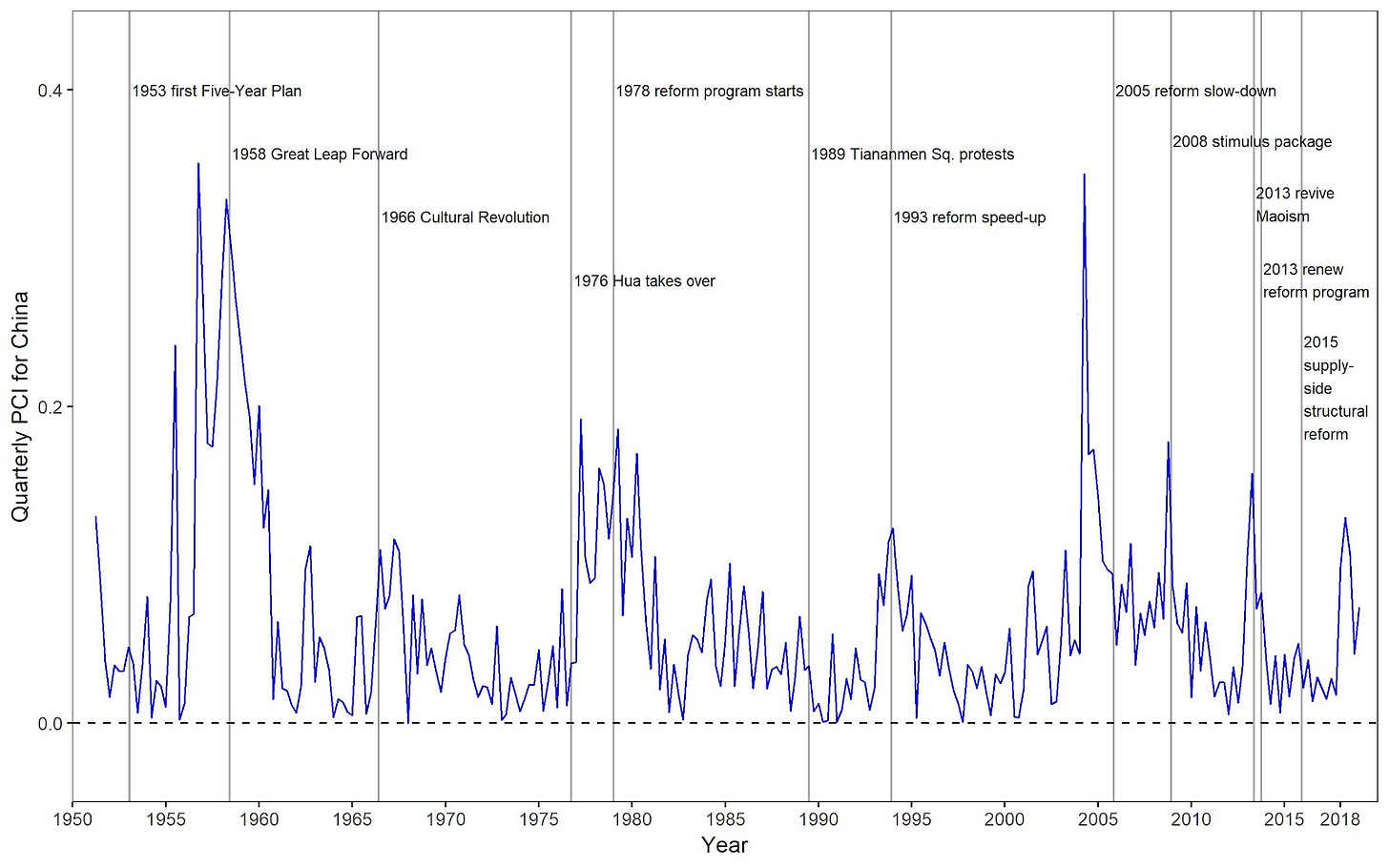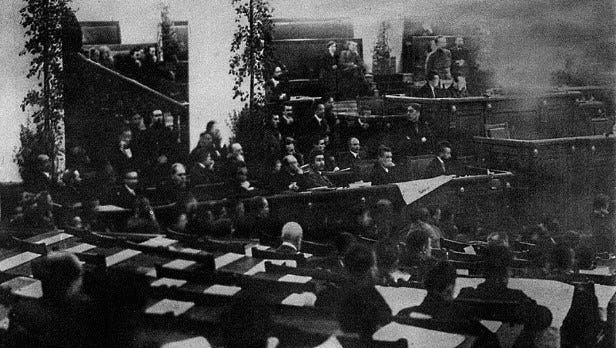Dear Human Readers,
The Policy Change Index (PCI) algorithm has been working hard since the October launch. As performance has improved and new data — the fourth quarter of 2018 — have come in, the algorithm is now making a prediction about the US-China trade fight. Julian TszKin Chan and Weifeng Zhong just wrote about it in a new AEIdeas blog post.
To recap, the PCI for China shows a sign of policy change in the first quarter of 2018. (See the chart below.) The Chinese government appears poised to take an even more aggressive approach on the global stage, especially in high-tech and trade-related areas. This is obviously not what trade hawks, including President Trump, are hoping for.
PCI-China shows a sign of change in 2018 Q1
As explained in the piece, the index’s uptick in early 2018 represents three coherent patterns: (1) strengthening the party’s authority and ratcheting up the anti-graft campaign, (2) playing up nationalism and projecting a stronger image in trade and oversea investment, and (3) using more populist policies to provide support for President Xi’s internal and external aggression.
Given these resounding signals, it would be wise to not get too optimistic when Xi’s top aide Liu He comes to Washington for trade talks. Just talks are all it might be.
COMMUNITY NEWS
In recent years, researchers have made important strides in understanding China’s opaque system by using an unusual source of information: the official data. The PCI, which “reads” the Communist Party tabloid, is not alone in this endeavor.
Kyle Jaros and Jennifer Pan study Xi’s rise to power by analyzing the words in China’s provincial newspapers. Their findings cast doubt on a common view that Xi quickly consolidated power and sidelined Premier Wen Jiabao in the first years of his rule. In Peter Lorentzen and Xi Lu’s paper, data on Chinese officials’ personal network are used to study the anti-corruption campaign in Xi’s first term. They show that, besides consolidating Xi’s power to some extent, the crackdown, surprisingly, really reined in China’s long-standing corruption problem. Rory Truex examines the time it takes for bills to pass China’s legislative body and finds that, contrary to popular perception, legislative gridlock can happen in authoritarian regimes, too.
WHAT'S NEXT
We humans know that words have different meanings in different contexts, but it’s not easy for machines to have that level of intelligence. For example, the word “account” in “I opened an account in a bank” and “the analysis didn’t account for a key factor” may well confuse a natural language processing (NLP) program.
Last October, researchers at Google AI open-sourced a new machine learning method called Bidirectional Encoder Representations from Transformers, or BERT, which makes a breakthrough in assigning meanings to words based on context. BERT sets 11 new records of various state-of-the-art NLP tasks, and it even beats humans sometimes.
It would be exciting to see how much improvement BERT can bring to the PCI project.
WHAT WE'RE READING
1917: Free History. This digital project led by Russian journalist Mikhail Zygar gives a fascinating modern makeover of the Russian Revolution. The website presents the century-old events as originally described by historical figures in their diaries, memoirs, and the like. Allowing readers to relive history in social media, the website has gained wide popularity, especially among Russia’s youth.
On January 17, 1918, for example, the poet Zinaida Gippius described the situation as “really tense” because the Constituent Assembly was to convene the next day to create a new constitution while Vladimir Lenin’s Bolsheviks were trying to gain control of it. But guess what the physiologist Ivan Pavlov had to offer? “If everything that the Bolsheviks are doing to Russia is an experiment, then I wouldn’t even have spared a frog for such an experiment,” Pavlov writes in his “timeline.” Yet, the “experiment” plowed ahead. After only 13 hours in session, Lenin shut down the democratically elected Constituent Assembly, kicking off seven decades of Communist dictatorship that had forever changed Russia and the world.
The Constituent Assembly in session on January 18, 1918
Image: Public domain
Edited by Weifeng Zhong and Julian TszKin Chan. Peter Hansen contributed to this letter.





